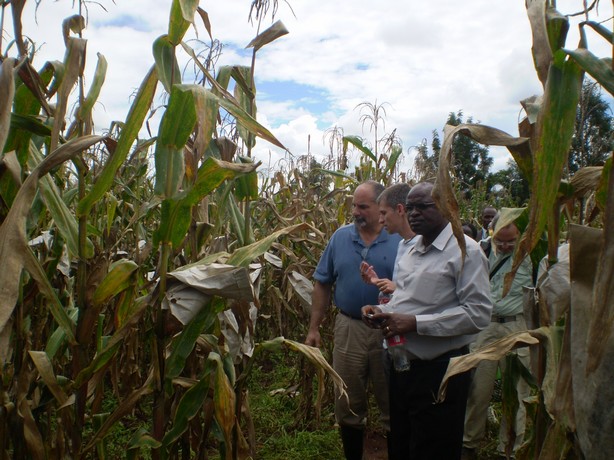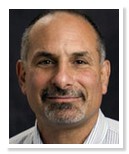“By being involved with GCP, I’ve had more opportunities to travel to the developing world and witness the problems that local farmers in these countries are facing, as well as to meet with the local researchers who are trying to overcome these problems. It has made me appreciate that these researchers also need the capacity to sustainably deal with agricultural problems once the project money starts to dry up.” – Leon Kochian (pictured), Professor, Cornell University, USA; and Director of Robert W Holley Center for Agriculture and Health, United States Department of Agriculture – Agricultural Research Service. Also Product Delivery Leader for GCP’s Comparative Genomics Research Initiative.
Bright and early beginnings in biology
For as long as Leon Kochian can remember, he’d always wanted to be a biologist.
“I remember my second-grade teacher reading a story to us about the white cliffs of Dover and thinking to myself ‘They’re white because they’re covered in the prehistoric remains of dead protozoan’,”’ says Leon with a chuckle. “Yes, I was a weird kid and that sort of stuff [biology] has always interested me.”
Having completed a Bachelor’s Degree in Botany at the University of California, Berkeley, and a PhD in Plant Physiology at the University of California, Davis (both in USA), Leon joined the United States Department of Agriculture based at Cornell University.
For 30 years, he has combined lecturing and supervising duties at Cornell, with his quest to understand the genetic and physiological mechanisms that allow some cereals to tolerate acidic soils.
The GCP model has always attracted me, particularly its focus on making an impact on farmers’ lives… I had already been a successful researcher having published more than 250 papers, but I felt little of that had made any real impact on the world.”
Identifying genes and breeding tolerant crops for African farmers
Leon and Cornell University have been involved with GCP since the Programme’s inception in 2004, playing a lead role in GCP’s Comparative Genomics Research Initiative, of which Leon is the Product Delivery Coordinator. Cornell University is a member of the GCP Consortium, with Leon as Cornell’s representative in the GCP Consortium Committee.
“The GCP model has always attracted me, particularly its focus on making an impact on farmers’ lives,” says Leon, who has been a Principal Investigator for several Comparative Genomics Research Initiative projects. “I had already been a successful researcher having published more than 250 papers, but I felt little of that had made any real impact on the world.”
During the first phase of the project, Leon led a team comprising of researchers from Cornell, EMBRAPA in Brazil and Moi University in Kenya.

Leon (left) with project colleagues, Jurandir Magalhães (EMBRAPA) and Sam Gudu (Moi University) in a maize field in Kenya in May 2010.
“We had been working for many years with both EMBRAPA and Moi University to identify the genes associated with aluminium tolerance in sorghum and maize and saw the potential to apply our research and expand it to explore other cereals such as rice and wheat,” explains Leon.
During GCP Phase I (2004–2008), the team successfully identified and cloned the major sorghum aluminium tolerance gene (AltSB). In Phase II (2009–2014), they are working towards breeding aluminium-tolerant sorghum lines for sub-Saharan Africa as well as applying what they have learnt to discover similar genes in rice and maize.
“Aluminium toxicity is a problem all over the world, but more so in Africa, as most farmers don’t have the money to manage it,” says Leon “These new aluminium-tolerant crops will improve African farmers’ yields, and, in turn, improve their quality of life.”
It’s like match.com for collaborative research and will hopefully foster greater collaboration between the two continents.”
Insights, connections and matchmaking
According to Leon, the funding from GCP has been very beneficial in making significant research progress on the projects he’s been involved with so far, and he is also quick to note the unexpected and very welcome non-monetary benefits from being involved with GCP.
“By being involved with GCP, I’ve had more opportunities to travel to the developing world and witness the problems that local farmers in these countries are facing, as well as to meet with the local researchers who are trying to overcome these problems. It has made me appreciate that these researchers also need the capacity to sustainably deal with agricultural problems once the project money starts to dry up.”
Working with GCP, Leon has designed and run workshops to train African scientists on molecular breeding techniques and hosted several postgraduate researchers at Cornell. He is now working with GCP collaborators to develop a database that will help African scientists find potential collaborators in USA and the rest of the Americas. “It’s like match.com for collaborative research and will hopefully foster greater collaboration between the two continents,” says Leon.
Research is such a fun and social experience! … I still love getting into the lab and discovering new things. I’ve also learnt to enjoy being the old guy in the lab!”
Growing greyer, growing wiser
Leon says his passion for biology and research is steadfast and has not waned through the years. Although he doesn’t get to do much of the hands-on work these days, it still remains the most enjoyable part of his job. “Research is such a fun and social experience! I still love getting into the lab and discovering new things. I’ve also learnt to enjoy being the old guy in the lab! Just watching and helping young researchers grow and develop their skills is really rewarding. Each of the 13 PhD students I’ve supervised is like one of my kids and I still keep in touch with all of them, as I do with my own PhD supervisor, 30 years on!”
Having recently celebrated his 60th birthday, Leon has no plans on slowing down anytime soon. “I’m currently Director of the Robert W Holley Center for Agriculture and Health, lecturing undergraduate and postgraduate students, supervising two PhD students and sitting on several boards, all the while trying to find time to write papers and do some research. It’s hard work but I enjoy it.”

The three faces of Leon: (1) in the lab in Cornell; (2) in the field, courtesy of USDA–ARS; and, (3) delivering opening remarks as Director of the Robert W Holley Center.
Leon tries to impart this philosophy to his students, believing scientists need to enjoy what they are doing, work hard at it, be flexible and creative, and, most importantly, not have ‘fear of failure’. “I don’t care how smart you are. If you’re not willing to work really hard and learn to improve yourself, then you’re not going to succeed.”
With regard to his GCP projects soon coming to a close when GCP sunsets in December 2014, Leon hopes he and team will succeed in meeting all their goals, but even if they don’t, he’s sure they’ll continue the research and try to discover more about aluminium tolerance. More power to them!
Leon’s slides, with links to more supplementary material after the slides
Links
- BLOGPOST: More on Leon’s work with GCP project colleagues
- Leon’s Product Delivery Coordinator profile
- The comparative genomics in cereals projects Leon leads – maize | maize and sorghum |rice
- Comparative Genomics – Research Initiative | InfoCentre | research products
- AUDIO CLIP: To retrace some of the work Leon and team have covered, listen to this 2007 clip (courtesy of WSKG, The DNA files, Aluminium-tolerant sorghum)
- FUNTIME! For any of Leon’s younger students and colleagues who think he’s the old guy in the lab, the little boy in Leon is never too far. Hunt for our lively Leon in this high-res group photo, and see what he gets up to when he’s being cheeky around his ‘elders and betters’! Go! (hint: left hand)








